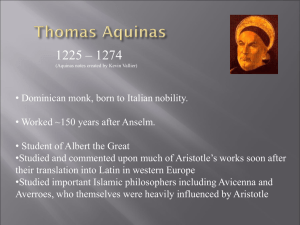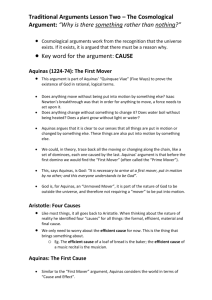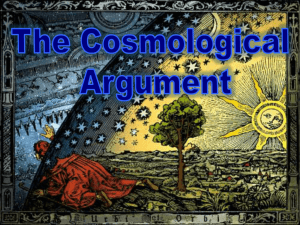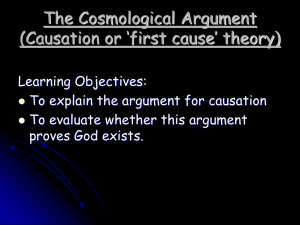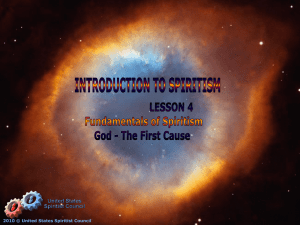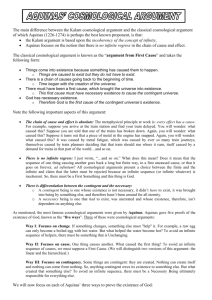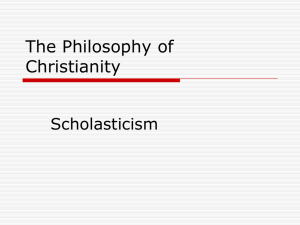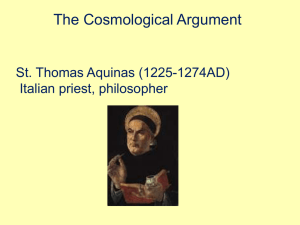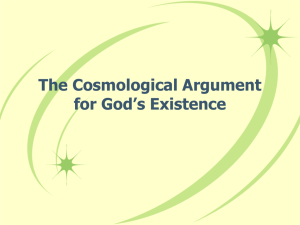Cosmological Argument - The Richmond Philosophy Pages
advertisement
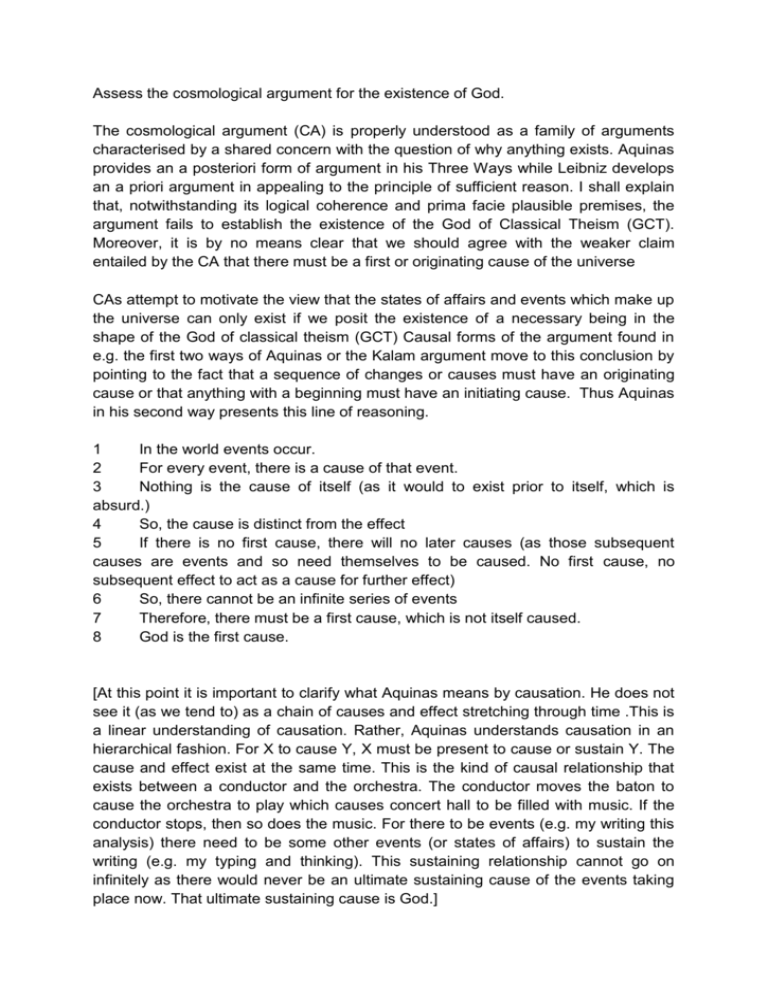
Assess the cosmological argument for the existence of God. The cosmological argument (CA) is properly understood as a family of arguments characterised by a shared concern with the question of why anything exists. Aquinas provides an a posteriori form of argument in his Three Ways while Leibniz develops an a priori argument in appealing to the principle of sufficient reason. I shall explain that, notwithstanding its logical coherence and prima facie plausible premises, the argument fails to establish the existence of the God of Classical Theism (GCT). Moreover, it is by no means clear that we should agree with the weaker claim entailed by the CA that there must be a first or originating cause of the universe CAs attempt to motivate the view that the states of affairs and events which make up the universe can only exist if we posit the existence of a necessary being in the shape of the God of classical theism (GCT) Causal forms of the argument found in e.g. the first two ways of Aquinas or the Kalam argument move to this conclusion by pointing to the fact that a sequence of changes or causes must have an originating cause or that anything with a beginning must have an initiating cause. Thus Aquinas in his second way presents this line of reasoning. 1 In the world events occur. 2 For every event, there is a cause of that event. 3 Nothing is the cause of itself (as it would to exist prior to itself, which is absurd.) 4 So, the cause is distinct from the effect 5 If there is no first cause, there will no later causes (as those subsequent causes are events and so need themselves to be caused. No first cause, no subsequent effect to act as a cause for further effect) 6 So, there cannot be an infinite series of events 7 Therefore, there must be a first cause, which is not itself caused. 8 God is the first cause. [At this point it is important to clarify what Aquinas means by causation. He does not see it (as we tend to) as a chain of causes and effect stretching through time .This is a linear understanding of causation. Rather, Aquinas understands causation in an hierarchical fashion. For X to cause Y, X must be present to cause or sustain Y. The cause and effect exist at the same time. This is the kind of causal relationship that exists between a conductor and the orchestra. The conductor moves the baton to cause the orchestra to play which causes concert hall to be filled with music. If the conductor stops, then so does the music. For there to be events (e.g. my writing this analysis) there need to be some other events (or states of affairs) to sustain the writing (e.g. my typing and thinking). This sustaining relationship cannot go on infinitely as there would never be an ultimate sustaining cause of the events taking place now. That ultimate sustaining cause is God.] In the Kalam argument the focus is on states of affairs having to have a beginning and that beginning requiring a cause. In a nutshell, this line of reasoning originating in medieval Islamic scholarship has this form. 1 2 3 4 Of anything that begins to exist, something causes it to exist. The universe began to exist. Therefore, there is a cause of the existence of the universe. That cause is God These causal arguments begin with empirical observations few would seriously challenge. We live in a world of temporally ordered causal relations and something coming into existence is itself an effect of some prior cause. However, in order to establish the key intermediate conclusion that a first cause is necessary they rely upon a suspicion of the infinite. Let me explain why this suspicion helps to motivate the CA. The possibility of an infinite sequence of causes is rejected. An infinite regress would be the result as we would never arrive at a final or ultimate cause in virtue of which we can ground explanation of subsequent events or states of affairs. Not only would the possibility of explanation evaporate if there were an actual infinity of events, but a mystery now arises. If any event requires a cause, then, in the absence of an initiating event there could be no chain of causes. But, we know there is a complex chain or network of events related by causation stretching back in time. So, there must be a first or initiating cause. That initial cause must itself be uncaused otherwise we are simply brought back to the original problem of explaining how any event can be caused. The need for a first cause draws further support from the view that an infinitely old universe (i.e. one in which here is an infinite chain of events or states of affairs) generates a paradox. If we call now t, then at t the universe is infinitely old (or, equivalently an infinite number of minutes have elapsed). Let us wait an hour and call that moment t2. It is intuitively obvious that at t2 the universe is older (by 60 minutes) than at t. But, infinity plus 60 is infinity. So, the universe does not age as time passes. This causal form of the CA is, however, ultimately unconvincing. First, even if it establishes a need for a first cause, it is by no means clear that this entails an ontological commitment to the GCT. Modern cosmology allows us to understand the emergence of space-time from a point of infinite density (singularity) in the Big Bang around 13.7 billion years ago. Unless one can motivate the view that an ontologically or conceptually more elegant theory positing God is somehow required for an explanation of Big Bang, then the need for a first cause is satisfied by Big Bang theory. It is hard to see as cogent the demand that God be introduced as the explanation for why there was a Big Bang that just invites the demand for an explanation of God. To say that the GCT is just basic or primitive is to beg the question without some further argumentation. Such reasoning goes beyond the CA to the ontological argument and its attempt to establish a priori the necessary existence of God. Second, we can reject the claim that every event must have a cause, which is a critical premise in the CA as set out in Ways I and II of Aquinas and the Kalam argument. As Hume observes it is not a matter of definition – a relation of ideas or analytic statement - that every event must have a cause. Likewise, it is not analytic that something cannot emerge from nothing. Of course, our limited experience of the universe supports these claims, but they are not necessary truths. Moreover, our experience does not underwrite the claim that it is a matter of fact that every event has a cause. [Consider, for example, radioactive decay] We can build on this point by following Kant in noting that to talk of something causing space-time or existing prior to it is to employ concepts which only really make sense when describing or explaining events or states in space-time. The very idea of something causing the universe to come into being goes beyond the limits of meaning. We can produce a well formed grammatical sentence, but it is philosophically meaningless. These challenges can be pressed against the form of the CA which focuses on the cause of the universe. In his third way Aquinas argues that contingent things must be ultimately sustained a necessary being. For, if there were just contingent things, then at some point in time there would have been nothing. So, there needs to be a necessary being to bring contingent things into existence. The problem with this line of reasoning is the possibility of there being no contingent entities does not entail that this would be the case. [Aquinas employs a faulty line of reasoning. He says that for all contingent things, if something is contingent then there exists a time which is prior to that thing. This is fine, but he goes on to say that this means there is a time for all contingent things which is prior to the existence of those things. That is a fallacious move. Consider the following: from for all x, if x is a son then there exists a y which is x's father we can't conclude there exists a y who is such that, for all x, if x is a son then y is x's father. More formally, [All x][Exists y](xRy) does not entail [Exists y][All x](xRy). It is possible, therefore, that at any time in an infinitely old universe there are finitely many things whose existence is owed to finitely many things at some earlier range of times T, whose existence is owed... etc and this is not contradictory.] However, this approach does point forward to the later demand of Leibniz that everything must have a complete or sufficient explanation and to Copleston’s employment of this principle in explaining why it is possible for there to be contingent entities. Any contingent entity must have a reason for its existence. Copleston argues that 1 This explanation may be provided by the existence of some other contingent being. But then we must explain these other contingent beings. 2 To repeat this ad infinitum is no explanation of why anything exists at all. 3 Therefore, what explains why contingent beings exist at all can only be a noncontingent being. 4 That is, a necessary being – GCT. However, this shift to the appeal to God as the necessary basis for an explanation of contingent entities or states does not resuscitate the CA. As Russell notes there is the risk that the CA is guilty of the fallacy of composition. Just because every event in space-time needs an explanation does not mean that the totality of space-time (i.e. the universe) does. Every member of the species has a mother, but it makes no sense to ask if the species has a mother. Just because we can ask what explains the universe does not entail that there must be an answer – and certainly not one that is cashed out in terms of the relationship between necessary and contingent beings. Finally, the force of the CA is diminished to the extent that we can allay the worries about the infinite. Thanks to the work of Cantor we have an understanding of the infinite sets and of there being infinities of different sizes. The counter-intuitive nature of the infinite is not a reason to be suspicious, but to recognise its nature [Cantor has established mathematical acceptability of actual infinities, thus sweeping away the always fragile distinction between actual and potential infinity the CA has sometimes exploited. In conclusion, neither appeal to causation or contingency succeeds in motivating the view that God exists. Nor does it even establish the claim that we must identify a first cause – at least where that initial ‘event’ is framed in the concepts we apply to events in space-time.

